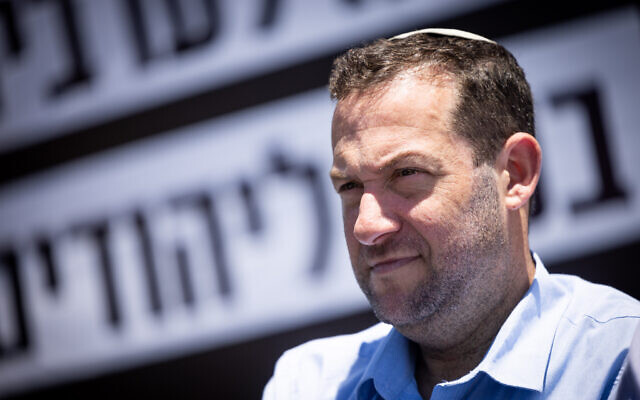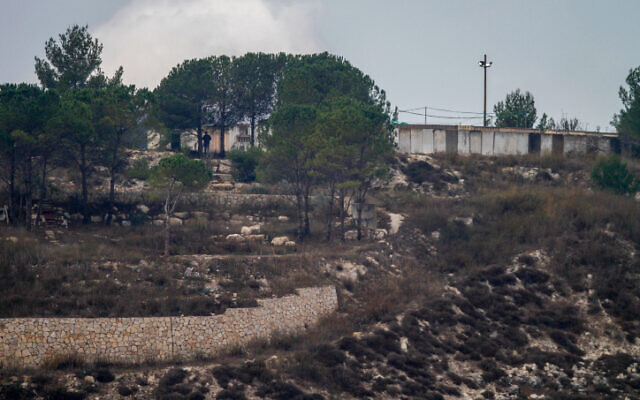While completely overshadowed this week by the outcry over Itamar Ben Gvir’s visit to the Temple Mountmore drama is brewing in other focal points of the Israeli-Palestinian conflict.
On any other week, most of the international headlines would have gone to the government’s intention to cancel key parts of the Disengagement Law and to potentially re-legalize the four northern West Bank settlements Israel withdrew from in 2005 — Homesh, Ganim, Kadim and Sa-Nur.
Prime Minister Benjamin Netanyahu’s sixth government is also potentially gearing up to change the reality in other longtime flashpoints, such as the Evyatar illegal outpost.
Taking advantage of the new government position — which constitutes a reversal of many years of policy, including by successive previous Netanyahu governments — around a thousand settlers are planning to spend the night of the Passover Seder this spring in Evyatar and 500 will head to Homesh, The Times of Israel’s Hebrew-language sister site Zman Yisrael has learned.
The settlers intend to refuse to leave the two outposts, both of which have a long history of legal battles and past evacuations.
Seder night falls this year on April 5, a few days after a deadline set by the High Court of Justice, which on Monday gave the government 90 days to explain why it won’t demolish Homesh, now a wildcat settlement built on private Palestinian land that houses a yeshiva and has been demolished and rebuild dozens of times in recent years.
“This will be the real test for the new government, in the field,” said one of the organizers. “This is no longer coalition deals and statements to the High Court. Thousands of us will return to settlements, legally, knowing we won’t be evacuated anymore.”
Right-wing activist Zvi Sukkot speaks during a protest against the government plan to reduce the number of new housing units planned to be built in the West Bank, outside the Prime Minister’s Office in Jerusalem, May 8, 2022. (Yonatan Sindel/Flash90)
This initiative is being pushed by Zvi Sukkot, a longtime Evyatar activist, a former executive director of Ben Gvir’s far-right Otzma Yehudit party, and most importantly — a likely incoming MK, who placed 16th on the Religious Zionism slate in the November election, in which the party, then in an alliance with Otzma Yehudit and Noam, won 14 seats. Several of these lawmakers are expected to resign soon under the so-called Norwegian Law as they become ministers, paving the way for those lower on the slate to enter Knesset and likely getting Sukkot a spot in the parliament soon.
Israel captured the West Bank from Jordan in the 1967 Six Day War. Some 600,000 Israeli settlers today live there alongside 2.7 million Palestinians, who want the territory for a potential future state. Much of the international community views all the settlements as illegal, whether Israel deems them legal or not.
The government’s new position on legalizing unauthorized settlements — drafted by Defense Minister Yoav Gallant, minister in the Defense Ministry Bezalel Smotrich and Justice Minister Yariv Levin — has sparked excitement among settlers, who are already feeling the change and view this week’s events as a watershed moment.

Samaria Regional Council head Yossi Dagan at a protest against the government plan to reduce the number of new housing units planned to be built on the West Bank, outside the Prime Minister’s Office in Jerusalem, May 8, 2022. (Yonatan Sindel/Flash90)
“My next home will be in Sa-Nur,” promised Yossi Dagan, head of the Samaria Regional Council.
Dagan, affiliated with the ruling Likud party, spoke on Monday with Gallant and told Zman Yisrael afterward: “As long as I’m alive, I will act to fix the disgrace of the Disengagement,” which saw Israel remove its entire military and civilian presence from the Gaza Strip, and also evacuate the four northern West Bank settlements.
While acknowledging the new government’s stance doesn’t mean all the settlements will be immediately rebuilt, Dagan said: “This enables [them] to legalize the Homesh yeshiva and to resolve this issue. We will rebuild the northern Samaria communities and will fix the moral crime of uprooting Jews from their homes for nothing.”
Homesh activists have already started to feel at home. On Wednesday, Chief Rabbi David Lau was slated to arrive at the Homesh yeshiva to deliver a Torah lesson. Last year, then-defense minister Benny Gantz prohibited the Ashkenazi chief rabbi from going to Homesh.

The unauthorized West Bank settlement outpost of Homesh, November 17, 2022. (Nasser Ishtayeh/Flash90)
In Evyatar, the situation is simpler than in Homesh, since 60 dunams (15 acres) of it have recently been determined to be state land, not private Palestinian land. While it was evacuated in July 2021, Gantz reached a deal with the residents to verify the legal status of the land. This was done in October 2021 and in February 2022 then-attorney general Avichai Mandelblit approved forming a legal settlement and yeshiva there.
Since then, nothing has happened.
Dagan did not say whether Evyatar came up in his meeting this week with Gallant, but said it was “a disgrace that the previous government didn’t fulfill the deal. It needs to be fulfilled in the coming months. This is stipulated in the government’s basic policy guidelines.”
However, the settlers are still afraid of one factor that may thwart their plans: Netanyahu himself.

Prime Minister Benjamin Netanyahu (C) meets with heads of Israeli settlement authorities at the Alon Shvut settlement in the Etzion Bloc in the West Bank on November 19, 2019. (Menahem Kahana/AFP)
Over the past few decades, Netanyahu and the settlers have come to respect — but also suspect — each other. The settlers don’t trust the premier and say they are all too familiar with the moment he tells them that national security and the diplomatic danger are more urgent than settling the West Bank. Many settlers believe Netanyahu gave up on the West Bank as part of former US president Donald Trump’s peace plan in 2020, when he agreed in principle to form a Palestinian state.
The question is what will happen at the moment of truth, when the settlers return on Passover to Evyatar. How will Netanyahu and Gallant react? What will Smotrich say?
In the meantime, the government is definitely pointing in a new direction on this matter and it’s a milestone from the settlers’ point of view. Today the Temple Mount — tomorrow Evyatar, Homesh and Sa-Nur.
